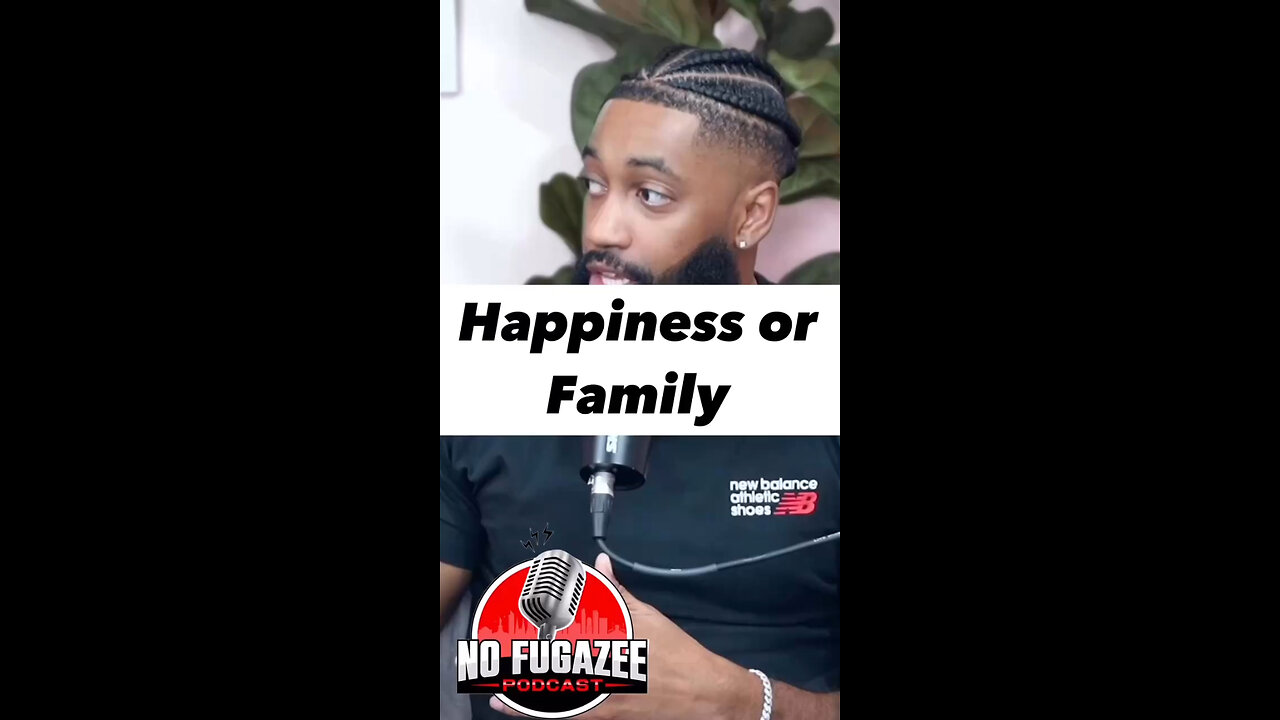Premium Only Content

The Happiness Dilemma: Balancing Individual Fulfillment and Family Commitment
Introduction: The Eternal Question
Would you sacrifice your happiness for your family, or your family for your happiness? This question touches on a universal tension between personal fulfillment and familial duty. The way men and women often approach this dilemma reflects deeper societal and psychological dynamics, and it may even explain why women initiate 70-80% of divorces.
This article delves into the contrasting perspectives on happiness, relationships, and sacrifice, exploring the implications of prioritizing personal happiness versus fulfilling one’s duty to family. We’ll uncover why this divide exists, its consequences, and how both men and women can navigate these complex choices to build more harmonious relationships.
1. The Nature of Happiness: Fleeting or Foundational?
1. Happiness as a Feeling
• Happiness is often described as an emotional state—an ever-changing experience influenced by external circumstances and internal perceptions.
• This transient nature means that happiness alone may not provide a stable foundation for lifelong commitments like marriage.
2. The Role of Purpose in Fulfillment
• While happiness is fleeting, purpose offers a deeper sense of fulfillment. Purpose-driven commitments—whether to a career, a cause, or a family—anchor individuals, providing meaning that endures beyond the highs and lows of emotions.
• For many men, purpose is prioritized over happiness, with family seen as a central component of that purpose.
2. The Gender Divide: Perspectives on Happiness and Family
1. Women’s Prioritization of Happiness
• Women are often socialized to value emotional fulfillment and connection. In relationships, this can translate into prioritizing their own happiness when they feel unfulfilled or unsupported.
• Studies show that women are more likely to leave relationships that no longer serve their emotional needs, reflecting a belief that individual well-being should not be sacrificed indefinitely.
2. Men’s Focus on Duty and Purpose
• Men, on the other hand, are often raised to view relationships as responsibilities rather than emotional exchanges. Sacrifice for the greater good—be it for a partner or children—is seen as a core component of masculinity.
• This perspective explains why many men stay in sexless or emotionally unfulfilling marriages, valuing stability and family unity over personal gratification.
3. The Cultural Impact
• Modern society’s emphasis on individual happiness and self-actualization has shifted traditional relationship dynamics. What was once viewed as noble self-sacrifice is increasingly seen as unnecessary self-denial.
• This cultural shift may contribute to the rising divorce rates, as partners seek personal fulfillment over maintaining a challenging relationship.
3. The Cost of Prioritizing Happiness
1. Impact on Family Stability
• When personal happiness is prioritized over family, the consequences often ripple outward. Divorce, for example, can lead to emotional and financial instability for children and long-term psychological effects for all parties involved.
• While leaving an unhappy relationship may benefit the individual, it can come at a significant cost to the family unit.
2. Short-Term Gains vs. Long-Term Fulfillment
• Pursuing happiness can sometimes lead to short-term relief but long-term dissatisfaction if it neglects deeper needs for connection, purpose, and stability.
• Family, despite its challenges, often provides a source of enduring fulfillment that transcends momentary happiness.
4. The Cost of Sacrificing Happiness
1. Resentment and Emotional Erosion
• Suppressing personal happiness for the sake of duty can lead to resentment, emotional withdrawal, and burnout.
• This dynamic often manifests in passive-aggressive behaviors, decreased intimacy, and a sense of emotional isolation within the relationship.
2. The Risk of Losing Individual Identity
• While sacrificing for family is admirable, doing so at the expense of personal identity and growth can lead to a life of regret.
• Both partners need space to grow individually while maintaining their commitments to the relationship and family.
5. Bridging the Divide: Rethinking Happiness and Sacrifice
1. Redefining Happiness in Relationships
• Happiness in relationships is not about constant bliss but finding joy in shared purpose, mutual respect, and collaborative growth.
• Shifting the focus from individual happiness to shared happiness fosters a sense of partnership and unity.
2. Balancing Duty and Personal Fulfillment
• The healthiest relationships strike a balance between individual needs and collective responsibilities. This means both partners must communicate openly about their desires, expectations, and limits.
• Sacrifices are inevitable, but they should be reciprocal and made with mutual understanding rather than imposed by societal norms or expectations.
3. Emotional Intelligence and Empathy
• Developing emotional intelligence allows couples to navigate conflicts and unmet expectations without resentment. By understanding each other’s emotional needs, partners can create a dynamic that values both duty and happiness.
6. Practical Advice for Couples
1. For Men
• Recognize that emotional fulfillment matters—not just for your partner but for yourself. Pursue purpose while also creating space for vulnerability and emotional connection.
• Communicate openly about challenges in the relationship and avoid the stoicism trap that leads to emotional suppression.
2. For Women
• Understand that fleeting happiness is not the same as long-term fulfillment. Assess whether your dissatisfaction stems from temporary circumstances or deeper, unfixable issues.
• If you choose to stay in a relationship, work with your partner to rebuild mutual understanding and shared goals rather than focusing solely on personal contentment.
3. For Both Partners
• Prioritize communication: Talk openly about your feelings, needs, and expectations.
• Invest in the relationship: Seek counseling, carve out time for intimacy, and nurture shared goals.
• Accept imperfections: Relationships are not always easy or happy, but they can still be meaningful and rewarding.
Conclusion: The Intersection of Happiness and Duty
The question of whether to prioritize happiness or family is deeply personal, and there is no one-size-fits-all answer. For some, pursuing personal happiness may be a necessary step toward living authentically. For others, sacrificing individual desires for the sake of family offers a sense of purpose and fulfillment that transcends personal gratification.
Ultimately, the key lies in balance: understanding that happiness and duty are not mutually exclusive but intertwined aspects of a meaningful life. By cultivating emotional intelligence, fostering open communication, and embracing shared purpose, couples can create relationships that honor both individual growth and family unity. In the end, it’s not about choosing one over the other—it’s about finding harmony between the two.
-
 1:32
1:32
FragmentsOfTruth
3 days agoJapan Declares State of Emergency After 96 Million Citizens Found with Nanobots – What Happens Next?
1701 -
 LIVE
LIVE
LFA TV
7 hours agoThe Trade War Ends | TRUMPET DAILY 2.4.25 7pm
377 watching -
 LIVE
LIVE
Quite Frankly
7 hours ago"Capitol Hill Headlines & The Utah Case" ft Lauren Conlin, The Zells 2/4/25
1,279 watching -
 LIVE
LIVE
The Big Mig™
13 hours agoKiller of Men To Healer of Men Dr. Joe Bannon
1,844 watching -
 LIVE
LIVE
Chrissy Clark
1 hour agoUSAID’s Corruption, DC Airport Workers ARRESTED, & Ibram X Kendi Canceled?! I Underreported Stories
325 watching -
 17:59
17:59
The Gun Collective
4 hours agoNEW GUNS THAT JUST CAME OUT!
3.06K2 -
 8:36
8:36
RealitySurvival
5 hours agoHow To Protect Your Solar Panels and Inverter From an EMP or CME!
1.98K -
 2:00:23
2:00:23
Revenge of the Cis
5 hours agoEpisode 1440: Shake and Bake
35.7K9 -
 1:15:54
1:15:54
Awaken With JP
8 hours agoUSAID Bombshell - Things Will Never Be The Same - LIES Ep 77
96.1K65 -
 1:55:50
1:55:50
In The Litter Box w/ Jewels & Catturd
1 day agoGov. Trudeau Agrees to Terms | In the Litter Box w/ Jewels & Catturd – Ep. 734 – 2/4/2025
81.4K52